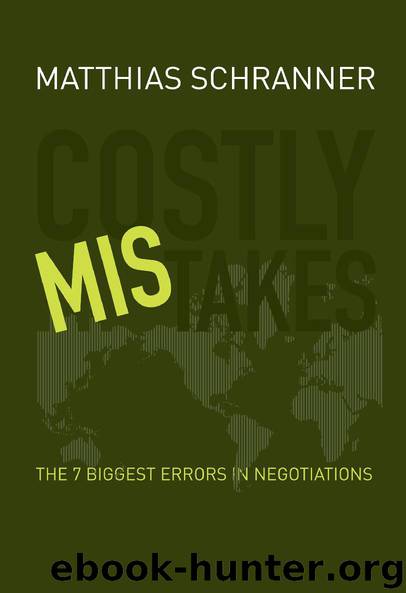Costly Mistakes by Matthias Schranner

Author:Matthias Schranner
Language: deu
Format: epub
Publisher: Schranner
Published: 2018-11-15T00:00:00+00:00
What you should do
Let me point it out one last time: During the affective phase you should stay calm.
You should calmly register all the signals that the other party is sending you, without commenting, let alone accepting them.
The concrete tactic now depends on your own negotiation personality, it must fit with your negotiation style.
What fits for almost all negotiators is acknowledging those signals by writing them down.
Therefore, at the beginning of the negotiation you should write down the demands that the other party makes, without commenting or accepting them.
Simply write down everything, do not make a big fuss about it, do not ask whether taking notes is allowed. Just write down your notes.
It is good to put down quotes and put time markers on them. This gives you then enough “ammunition” during the negotiation to corner the other party.
For the sake of clarity, I would like to point out here a principle that is very important to me. Of course it is possible to put pressure on the other party, of course is it allowed and sensible to not accept everything. Of course we will leave the negotiation as the winner.
But our moment comes during the negotiation, mainly at the end and not at the beginning.
We stay calm and take our notes.
Please, no grinning, no derisive remarks, no provoking gestures.
We stay calm and avoid sending out signals that could provoke our opponent.
If it fits your style, you can also briefly acknowledge the other party’s demand. Say something like, “difficult” or “interesting”, or simply “oh”.
It is important for you to say one word only; do not enter into a justification.
If you have a big presence and a polarizing personality, then you should avoid even such brief remarks. Let me quote Goethe’s “Faust” once more here, “It is the dosage that makes the poison.”
If you are a good observer, if you speak softly and act in a reserved manner, you should feel free to comment your opponent’s speech with “difficult”.
Small talk
In the affective phase, too, we can learn and benefit from other cultures. Especially the Chinese and Arab cultures are role models in this regard.
At the beginning of a negotiation, other cultures practice what we call small talk. Some cultures, such as the German culture, do not know about that – we do not want to waste any time and jump right in.
After having inquired about how the trip was and whether the participants would like some coffee, we start dealing with the issue at hand. We say what we want and say what we do not want. We say, “Yes, this works,” and “No, this does not work.”
Other cultures avoid this type of early commitment and with it the quick entry into the negotiation.
People talk about the weather, sports and how everybody is doing. The English call that “light and social conversation”.
Charged topics, such as politics and religion, are avoided, as are private matters, such as marital status or children; preferred are social topics that concern everyone.
“Pay attention without bending!” is the motto here.
Download
This site does not store any files on its server. We only index and link to content provided by other sites. Please contact the content providers to delete copyright contents if any and email us, we'll remove relevant links or contents immediately.
Hit Refresh by Satya Nadella(9134)
The Compound Effect by Darren Hardy(8967)
Change Your Questions, Change Your Life by Marilee Adams(7781)
Nudge - Improving Decisions about Health, Wealth, and Happiness by Thaler Sunstein(7706)
The Black Swan by Nassim Nicholas Taleb(7129)
Deep Work by Cal Newport(7083)
Rich Dad Poor Dad by Robert T. Kiyosaki(6632)
Daring Greatly by Brene Brown(6513)
Principles: Life and Work by Ray Dalio(6447)
Playing to Win_ How Strategy Really Works by A.G. Lafley & Roger L. Martin(6305)
Man-made Catastrophes and Risk Information Concealment by Dmitry Chernov & Didier Sornette(6019)
Big Magic: Creative Living Beyond Fear by Elizabeth Gilbert(5771)
Digital Minimalism by Cal Newport;(5764)
The Myth of the Strong Leader by Archie Brown(5507)
The Slight Edge by Jeff Olson(5417)
Discipline Equals Freedom by Jocko Willink(5389)
The Motivation Myth by Jeff Haden(5212)
The Laws of Human Nature by Robert Greene(5208)
Stone's Rules by Roger Stone(5088)
